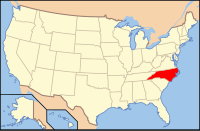Wake County Parks and Recreation
| Wake County, North Carolina | ||
|---|---|---|

Wake County Courthouse
|
||
|
||
 Location in the U.S. state of North Carolina |
||
 North Carolina's location in the U.S. |
||
| Founded | June 4, 1771 | |
| Named for | Margaret Wake | |
| Seat | Raleigh | |
| Largest city | Raleigh | |
| Area | ||
| • Total | 857 sq mi (2,220 km2) | |
| • Land | 835 sq mi (2,163 km2) | |
| • Water | 22 sq mi (57 km2), 2.6% | |
| Population (est.) | ||
| • (2016) | 1,046,791 | |
| • Density | 1,253/sq mi (484/km²) | |
| Congressional districts | 2nd, 4th | |
| Time zone | Eastern: UTC-5/-4 | |
| Website | www |
|
Wake County is a county in the US state of North Carolina. As of July 1, 2015, the population was 1,024,198, making it North Carolina's second-most populated county. From July 2005 to July 2006, Wake County was the 9th fastest-growing county in the United States, with the town of Cary and the city of Raleigh being the 8th and 15th fastest-growing cities, respectively.
Its county seat is Raleigh, which is also the state capital. Eleven other municipalities are in Wake County, the largest of which is Cary, the third largest city of the Research Triangle region and the seventh largest municipality in North Carolina.
It is governed by the Wake County Board of Commissioners, coterminous with the Wake County Public School System school district, with law enforcement provided by the Wake County Sheriff's Department. It is also part of the wider Triangle J Council of Governments which governs regional planning.
Present day Wake County was once part of the Tuscarora nation.
Wake County was formed in 1771 from parts of Cumberland County, Johnston County, and Orange County. The first courthouse was built at a village originally called Wake Courthouse, now known as Bloomsbury. In 1771, the first elections and court were held, and the first militia units were organized.
Wake County lost some of its territory through the formation of other counties. Parts were included in Franklin County in 1787, and in Durham County in both 1881 and 1911.
During the colonial period of North Carolina, the state capital was New Bern. For several years during and after the Revolutionary War there was no capital, and the General Assembly met in various locations. Fayetteville was the state capital from 1789 to 1793, when Raleigh became the permanent state capital. In 1792, a commission was appointed to select a site to build a permanent state capital. The commission members favored land owned by Colonel John Hinton across the Neuse River, but the night before the final vote the committee adjourned to the home of Joel Lane for an evening of food and spirits. The next day, the vote went in Lane's favor.
...
Wikipedia

